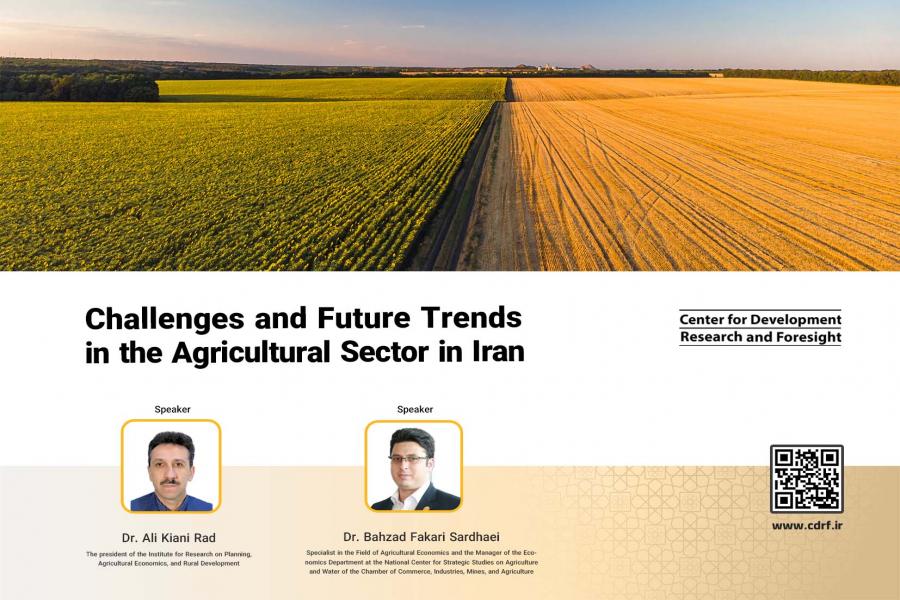
-
بررسی آییننامهها و دستورالعملهای برنامه هفتم پیشرفت
-
بررسی عوامل موثر بر افزایش تصادفات و تلفات جادهای و سوانح رانندگی و دادهکاوی تلفات انسانی
-
سازماندهی و بازآرایی فضایی آموزش عالی کشور
-
به روز رسانی سند ملی آمایش سرزمین
-
انجام مطالعات مناطق آزاد به عنوان نواحی پیشران اقتصادی کشور
-
اصلاح ساختار بودجه و پیاده سازی نظام یکپارچه مدیریت اطلاعات مالی دولت (IFMIS)

Agriculture plays a critical role in Iran's economy, providing employment for over 15% of the workforce. While the sector holds immense potential for growth and development, it also faces significant challenges. Identifying these challenges and their impact on the agricultural system is essential for policymakers and stakeholders to formulate effective and targeted policies that address both current and potential issues, thereby enhancing the sector's resilience and enabling it to achieve sustainable development goals.
The following recommendations are based on the insights of the scientific chairperson and speakers at the scientific conference titled "Challenges and Future Trends in the Agricultural Sector in Iran":
- Consumption-Related Recommendations:
Price Stabilization and Domestic Market Regulation for Foodstuffs:
Implement targeted subsidies and budgetary allocations to stabilize food prices and maintain a regulated domestic market for essential foodstuffs.
Food and Basic Goods Reserves Enhancement:
Augment domestic production and strategic imports to replenish food and basic goods reserves, ensuring adequate supply and mitigating potential shortages.
Foodstuffs and Products Export Restrictions:
Impose export restrictions, quotas, and export duties on specific foodstuffs and products to manage their outflow, preventing domestic shortages and maintaining price stability.
Foodstuffs and Products Import Barriers Reduction:
Eliminate or reduce import restrictions, tariffs, and duties on foodstuffs and products to facilitate their inflow, enhancing market availability and competition.
Imported Raw Material Substitution:
Identify and implement strategies to replace imported raw materials with domestic alternatives, promoting sustainable food production and reducing reliance on external sources.
Quantity Restrictions on Target Goods Purchases:
Introduce quantity restrictions on the purchase of essential goods (cooking oil, flour, etc.) in chain stores to manage demand, prevent hoarding, and ensure equitable access for all consumers.
- Production-Related Recommendations:
Essential Production Inputs Provision Planning:
Devise strategies to secure the timely and adequate provision of essential production inputs for basic products. This may involve distribution from reserves, input subsidies, and the establishment of strategic supply chains.
Cultivation and Production Level Enhancement Planning:
Formulate comprehensive plans to elevate the level of cultivation and production. This could include measures such as increasing guaranteed purchase prices, providing product subsidies, and implementing innovative agricultural practices.
Production Inputs Export Prohibition:
Restrict the export of critical production inputs, such as fertilizers, to safeguard domestic supply and prevent potential shortages that could hinder agricultural production.
Intermediate Goods Export Restriction:
Implement export restrictions on intermediate goods, particularly oilseeds, to ensure their availability for domestic processing and value addition within the agricultural sector.
Policymaking Goals and Directions in Support of the Agricultural Sector
- Formulating policies to enhance the resilience of the agricultural sector in anticipation of numerous future challenges, including the assurance of food security for an estimated global population of 9 billion people.
- Increasing the involvement of the agricultural sector in economic growth and poverty alleviation in both rural and urban communities, particularly in developing countries and emerging economies.
- Enhancing the productivity of all factors of production, with a specific emphasis on essential resources such as water and soil.
- Developing policies to aid the agricultural sector in the effective management of risk.
- Implementing policies that cover the entire value chain of the agricultural sector, including production, processing, distribution, and consumption.
- Providing comprehensive support for producers and targeted assistance for consumers of food and agricultural products.
- Leveraging the expertise and resources of the non-governmental sector to complement and cooperate with government initiatives in implementing policies that support the agricultural sector.
- Prioritizing the four pillars of food security – availability, access, utilization, and stability – by taking into account models and forecasts that predict no country will be a net exporter of foodstuffs by 2050. Self-sufficiency and adapting consumption patterns are crucial to ensure long-term food security.



